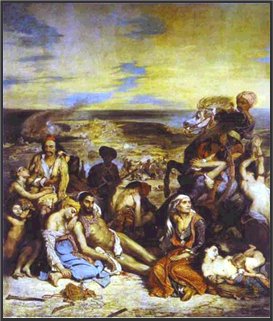


xxxxxGreek civilisation, like
that of Rome, came to an end with the barbarian invasions during the
5th to the 7th century. However, the Greek language and much of
Greek culture survived within the Byzantine Empire. As we have seen,
this empire was occupied by Western princes when its capital,
Constantinople, was sacked by the Crusaders in 1204, and then
overthrown by the Ottoman Empire in 1453
(H6). For nearly 400 years much of Greece
was under Turkish rule, and it was not until 1770 that the first
attempt was made to break free. This failed, but in 1821 there were uprisings across
the country. However, disputes between the various Greek factions,
and the lack of organisation hindered the rebel’s cause, and it was
not until 1827 that the war turned in their favour. In that year,
Russia, Britain and France put pressure on the Sultan, and defeated
a combined Turko-
GREECE AND ITS WAR OF INDEPENDENCE
1821 -
Acknowledgements
Massacre of Chios:
by the French painter Eugène Delacroix (1798-
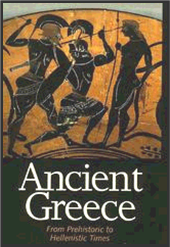 xxxxxThe classical age of Greece dates from about the 6th
century BC, when a large number of city-
xxxxxThe classical age of Greece dates from about the 6th
century BC, when a large number of city-
xxxxxWith the coming of the barbarian invasions from the 5th to the 7th century, ancient Greek civilisation, like that of Rome, finally came to an end. However, much of Greece, together with its language and culture, survived as part of the Byzantine Empire, the eastern half of the Roman Empire which had been established by Emperor Constantine in 324. For the most part, this situation remained until the opening years of the 13th century when, ironically enough (as we have seen) it was the Crusaders who, in 1204 sacked Constantinople and took over Greece as well as Anatolia. All except the rugged interior was divided into states, governed by Western magnates or by the maritime republics of Venice and Genoa.
xxxxxThis occupation lasted until 1453 (H6). It was then that Constantinople was captured by the Turks, and Greece found itself part of the expanding Ottoman Empire. Turkish rule, as elsewhere, was harsh, but, some islands, such as Rhodes and Crete, held out for many years and, once again, the central, mountainous areas were little affected. Furthermore, quite a large number of Greeks were retained as administrators, and the Orthodox Church was left in tact, providing, as it so happened, a focus for Greek nationalism. Nonetheless, Greece remained under Turkish domination for close on 400 years. It was not until the latter part of the 18th century, in 1770, that Turkish rule was challenged. The attempt failed, but the coming of the French Revolution kept alive the flame of rebellion. A powerful secret society (the Friendly Society) was formed in 1814, and this began making plans for a widespread armed revolt. When it came, it was to be a bloody, cruel conflict with atrocities committed by both sides.
xxxxxFor the first three years
of the war the Greeks fought virtually alone, their cause seriously
hampered by constant strife between various factions, and a
consequent lack of coordination. The revolt broke out in Wallachia
in February 1821, spread to Moldavia the
following month, and then led to a general uprising in the
Peloponnese, led by Germanos, archbishop of Patros. The rebels met
with only limited success, but in 1822 they adopted a liberal
republican constitution, declared their independence, and appealed
to Tsar Alexander I for Russian support. It was in that year that
the Turks invaded Greece in force and their fleet captured the
island of Chios and massacred its inhabitants -
xxxxxIn 1824 the war escalated.
The ruler of Egypt, Muhammad Ali, wooed by the promise of substantial territorial
gains (including Crete), joined forces with the Sultan of Turkey,
Mahmud II. By 1826, he and his son, Ibrahim Pasha, had conquered the
whole of the southern peninsula of Greece, the Peloponnese.
The following year, 1827, saw the turning point as far as the Greeks
were concerned. The Turks entered Athens in that year but, by the
Treaty of London, Russia, Britain and France, alarmed above all by
the intervention of Muhammad Ali and his territorial gains, agreed
to recognise Greek independence, and to persuade the Sultan to come
to terms. Though the British government regarded this action as
“peaceful interference”, in the October of that year a combined
allied naval force took the opportunity to destroy a Turco-
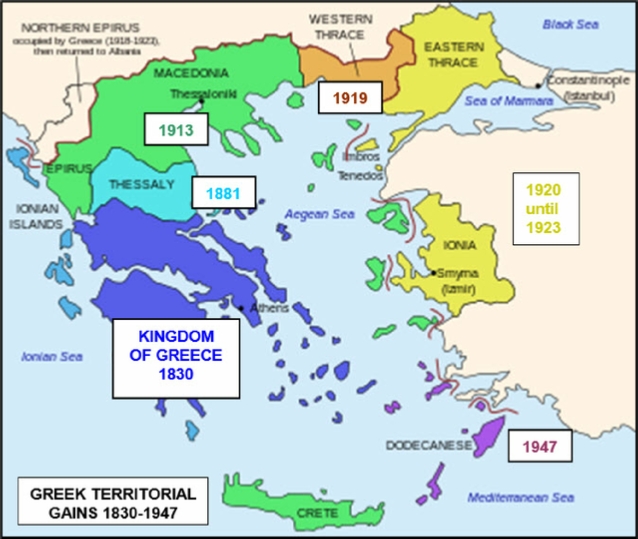 xxxxxIt was at this stage that Muhammad Ali agreed to
British demands to quit Greece, andxin
September 1829 the Treaty of Adrianople (sometimes known as the Treaty of Edirne) brought an
end to the Russo-
xxxxxIt was at this stage that Muhammad Ali agreed to
British demands to quit Greece, andxin
September 1829 the Treaty of Adrianople (sometimes known as the Treaty of Edirne) brought an
end to the Russo-
xxxxxIncidentally, (see
map above), the Greece that gained its independence in 1830 was considerably
smaller than the modern nation. It was made up of only the southern
part of the peninsula and the Cyclades, a group of some 30 islands
in the Aegean Sea. The Ionian Islands were not ceded by Britain
until 1864, and the annexation of northern Greece, achieved in three
stages, was not completed until 1922. And it was only at the end of
the Second World
War in 1947 that Italy relinquished Rhodes and the Dodecanese, a
group of islands off the south-
xxxxx……
Although, in 1821, the reactionary governments of Europe were
anxious to maintain the existing order -
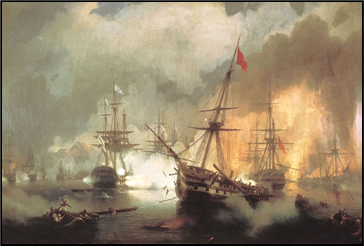 xxxxx…… ThexBattle
of Navarino, fought in October 1827,
proved to be decisive because the destruction of their fleet left
the Turks in Greece with no supply line and no ready means of
escape. In fact, however, it was a battle which was not meant to be.
The Allies, wishing to persuade the Turks to grant the Greeks
independence, sent a combined fleet to Navarino to negotiate a
Turkish withdrawal. Mistaking their intention, a Turkish ship fired
on a British gunboat as it approached, and battle was joined! In
less than two hours the Turko-
xxxxx…… ThexBattle
of Navarino, fought in October 1827,
proved to be decisive because the destruction of their fleet left
the Turks in Greece with no supply line and no ready means of
escape. In fact, however, it was a battle which was not meant to be.
The Allies, wishing to persuade the Turks to grant the Greeks
independence, sent a combined fleet to Navarino to negotiate a
Turkish withdrawal. Mistaking their intention, a Turkish ship fired
on a British gunboat as it approached, and battle was joined! In
less than two hours the Turko-
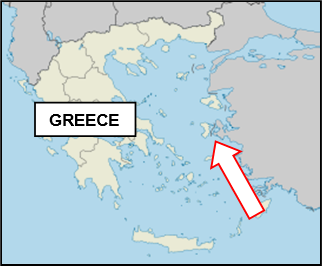 xxxxxX…… Somexof
the money raised to support the independence movement went to the
survivors of the infamous “Chios
Massacre” of 1822. Having occupied the
island, the Turks slaughtered all males over the age of 12 and all
women over 40, the total estimated at 25,000, but put much higher by
some sources. The remainder, well over double that number, were sold
in the slave markets of Turkey, Africa and the Middle East. This
atrocity, by far the worst of the war, aroused an enormous amount of
sympathy and practical support for the Greek struggle for
independence, especially as some youngsters managed to escape -
xxxxxX…… Somexof
the money raised to support the independence movement went to the
survivors of the infamous “Chios
Massacre” of 1822. Having occupied the
island, the Turks slaughtered all males over the age of 12 and all
women over 40, the total estimated at 25,000, but put much higher by
some sources. The remainder, well over double that number, were sold
in the slave markets of Turkey, Africa and the Middle East. This
atrocity, by far the worst of the war, aroused an enormous amount of
sympathy and practical support for the Greek struggle for
independence, especially as some youngsters managed to escape -
xxxxx…… The massacre was vividly captured on canvas by the French painter Eugène Delacroix (illustrated above), and the French poet and novelist Victor Hugo wrote a poem entitled L’enfant de Chios. The first two verses are given below:
The Turks have passed here. Destruction is everywhere.
Chios, the isle of vines, lies black and
bare -
Chios, in the leaves shade,
Whose seas used to reflect its wooded height,
Its slopes and villas, and sometimes at night
The girls who danced and played.
Deserted. No: beside the blackened stone
A blue-
And bows his downcast head.
His only stronghold and security
Is a white hawthorn -
Ignored among the dead...
Including:
The Treaty of
Adrianople, 1829

G4-



